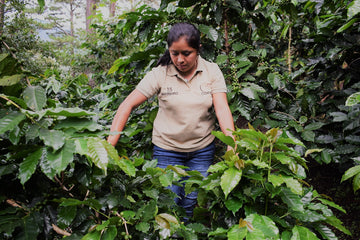
Alba Rosa Claros
Finca El Liquidámbar
Barrio La Victoria, Marcla, La Paz Honduras
This single origin microlot is the product of Alba Rosa Claros, a hardworking farmer and business woman with deep roots in coffee. Having grown up among coffee trees, she understands the importance the product plays in the life of her family, her community, and the environment: “As producers, we are contributing to the environment. This is why we are producing high quality, organic coffee.”
For Alba Rosa, there is always more to learn and discover in the world of coffee: every harvest offers an opportunity to make improvements and produce a higher quality product. She takes care of each one of her coffee plants, giving them individualized attention, ensuring that every step of the production process tends to the needs of the coffee. “I am excited to be able to create a special product for the final consumers of my coffee, that every single act on my coffee, from harvest to drying, has maximized its quality potential."
Since 2011, she has been an active member of COMSA, a well-established and progressive coffee cooperative in Honduras. By participating in their quality programs and workshops, she can take on new challenges and implement techniques or processes that improve her quality. This microlot comes as a result of experimenting with honey and natural processes. When speaking about her coffee process, Alba Rosa notes that "honey coffee involves a very slow process that requires a lot of patience, but with it, we are able to maximize the coffee's quality potential. We do it with a lot of passion, thinking about the final consumer who will be tasting our coffee".
"As a family, we are very happy to be part of the COMSA enterprise. It's because of COMSA that we have learned about special processing for differentiated, high quality coffees. As a woman and as a producer, I continue learning new things."
Honey Process: Like the normal washed process, harvest begins when the coffee cherry reaches peak ripeness (red cherries!) The cherries are removed from the tree, by hand; they are then floated in water barrels for 48 hours, allowing for a slight fermentation. This helps develop the flavour of the beans (the “pits” of the cherry) and gives honey-processed coffee that subtle but unique characteristic of sweetness and fruit. The cherries are then de-pulped and transferred to a patio in the sun. For the first few days of drying, the coffee is turned every 15 to 20 minutes. As the moisture goes down, turning can be less frequent. Drying may last up to 21 days, depending on weather. After it reaches optimal moisture, it is hulled, cleaned, sorted, and prepared for export.
